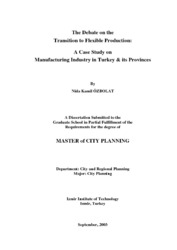Please use this identifier to cite or link to this item:
https://hdl.handle.net/11147/3205Full metadata record
| DC Field | Value | Language |
|---|---|---|
| dc.contributor.advisor | Süel, Akın | en |
| dc.contributor.author | Özbolat, Nida Kamil | - |
| dc.date.accessioned | 2014-07-22T13:51:04Z | - |
| dc.date.available | 2014-07-22T13:51:04Z | - |
| dc.date.issued | 2003 | en |
| dc.identifier.uri | http://hdl.handle.net/11147/3205 | - |
| dc.description | Thesis (Master)--Izmir Institute of Technology, City and Regional Planning, Izmir, 2003 | en |
| dc.description | Includes bibliographical references (leaves: 195-202) | en |
| dc.description | Text in English; Abstract: Turkish and English | en |
| dc.description | ix, 202 leaves | en |
| dc.description.abstract | This thesis is mainly about the .flexible production. debates, which were introduced by the 1970s and are still concerned in various scientific disciplines. The debate has been considered not only as concerns of the transformations within the production, but also in parallel to the holistic transformation of the capitalist system. The fundamental emphasis has been on the fact that capitalism is a historical system and on its relations with .industrial production. and 'industrialization' processes.From this perspective, the three widely known approaches to flexible production, namely the 'neo-Schumpeterian approach', the 'flexible specialization approach', and the 'regulation school approach', have been evaluated in detail. It has been firmly emphasized that each of these approaches provided considerable statements within the debates on flexibility. The thesis in general has favoured the regulation school approach with its methodological means, and highlighted that it has developed the most appropriate approach in comprehensively explaining the ongoing processes.The thesis has focused on the spatial relations of flexible production debates at the city and regional levels, and highlighted the transformation on/of space throughout the transition processes. By means of a comprehensive case study on the changes in the spatial organizations of Turkey and on locational distribution of industry in relation to flexible production processes, it has been emphasized that space has a major role in current economic and social changes, and furthermore, that the experienced transformations are quite related with the successes in the urban and spatial organizations. Within the study, the urban and regional level changes have been analyzed quantitatively, and the subjects such as growth rates, comparative priorities, and the development of spatial advantages have been tested by the use of shift-share analysis. | en |
| dc.language.iso | en | en_US |
| dc.publisher | Izmir Institute of Technology | en |
| dc.rights | info:eu-repo/semantics/openAccess | en_US |
| dc.subject.lcc | TS155.65 .O99 2003 | en |
| dc.subject.lcsh | Flexible manufacturing systems | en |
| dc.subject.lcsh | Flexible manufacturing systems--Management | en |
| dc.subject.lcsh | Industrial management--Turkey | en |
| dc.subject.lcsh | Industrialization | en |
| dc.title | The debate on the transition to flexible production: A case study on manufacturing industry in Turkey and its provinces | en_US |
| dc.type | Master Thesis | en_US |
| dc.institutionauthor | Özbolat, Nida Kamil | - |
| dc.department | Thesis (Master)--İzmir Institute of Technology, City and Regional Planning | en_US |
| dc.relation.publicationcategory | Tez | en_US |
| item.fulltext | With Fulltext | - |
| item.grantfulltext | open | - |
| item.languageiso639-1 | en | - |
| item.openairecristype | http://purl.org/coar/resource_type/c_18cf | - |
| item.cerifentitytype | Publications | - |
| item.openairetype | Master Thesis | - |
| Appears in Collections: | Master Degree / Yüksek Lisans Tezleri | |
Files in This Item:
| File | Description | Size | Format | |
|---|---|---|---|---|
| T000275.pdf | MasterThesis | 4.04 MB | Adobe PDF |  View/Open |
CORE Recommender
Page view(s)
170
checked on Nov 18, 2024
Download(s)
132
checked on Nov 18, 2024
Google ScholarTM
Check
Items in GCRIS Repository are protected by copyright, with all rights reserved, unless otherwise indicated.